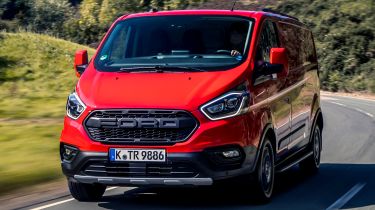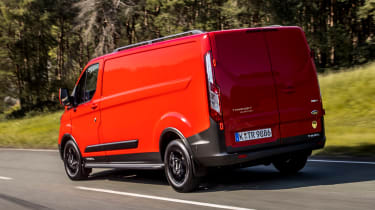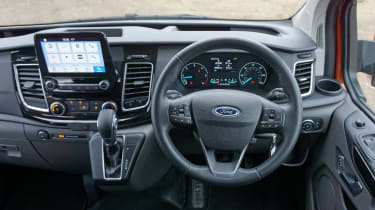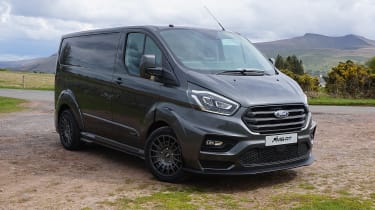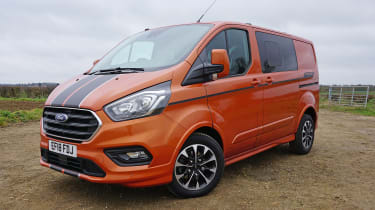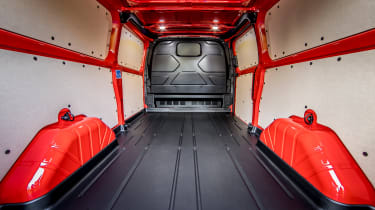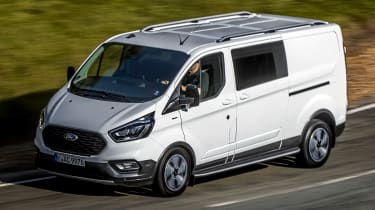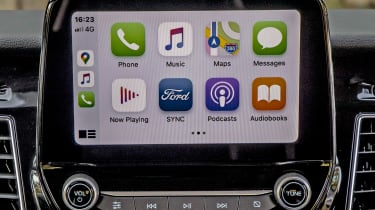Ford Transit Custom (2012-2023) van review
The Ford Transit Custom (2012-2023) features car-like tech to challenge the VW Transporter and Mercedes Vito for class honours
The Ford Transit Custom is currently our favourite medium-sized panel van. The first version of the van arrived in 2012, but in 2017 it was brought up to date with a new look, and from there revisions have kept it competitive right up to the present day.
It’s not just a great van, it’s a popular one too - it was the best-selling vehicle in the UK in 2021, and there are some car makers that sell fewer cars in a full year than Ford sells Transit Customs. It is the mid-sized model of the Transit range, sitting above the Transit Connect but below the Transit in terms of size.
Upgrades over the years have focused on interior quality, which makes the Transit Custom rather more car-like inside than you might expect.You get all kinds of tech inside the van now, including Ford’s SYNC3 infotainment system that’s packed with features and is really easy to use.
There are plenty of body styles to choose from, including L1 and L2 wheelbases, while both lengths are offered with H1 and H2 roof heights. Unlike some high-roof models, the H2 doesn't offer extra stowage above the driver's head in the cab - instead, the load area reaches forward over the cab. All vans have double sliding side doors and 50:50 split rear doors, while a tailgate is offered instead of double doors at the rear, and you can get windows as well.
Used - available now

2023 Audi
e-tron
39,863 milesAutomaticElectric
Cash £19,200
2025 Audi
Q5
25,432 milesAutomaticDiesel2.0L
Cash £28,200
2023 Land Rover
Range Rover Evoque
39,551 milesAutomaticPetrol1.5L
Cash £22,400
2021 SEAT
Arona
17,627 milesManualPetrol1.0L
Cash £12,087If you need an extra row of seats, look for the Double Cab In-Van model, which features a bulkhead behind the seats and sliding doors with windows. You can get this in L1 and L2 lengths, and if you want more room for passengers then you can consider the Tourneo Custom, which is an eight-seat passenger carrying variant of the Transit Custom. This is technically a car and not a commercial vehicle, though.
It doesn’t stop there, as there’s also the Transit Custom Kombi, which sits in between these two passenger-carrying variants - it’s a window van that can be ordered with up to nine seats, or can be fitted out to customer needs, such as for private hire or wheelchair access.
All versions of the Transit Custom are front-wheel drive and most people will choose the 2.0-litre EcoBlue diesel in 104bhp, 128bhp, 168bhp and 182bhp forms, usually with a manual gearbox - though a six-speed auto is available on all but the lowest-power model. There are also mHEV versions of this engine using mild hybrid power to boost efficiency slightly.
A plug-in hybrid is also available, the Transit Custom PHEV. This uses Ford's 1.0 EcoBoost three-cylinder turbo petrol engine connected to an electric motor that drives the front wheels and a battery pack that's located under the load floor, although this doesn't affect load volume. There's a power output of 124bhp, but the electric motor offers instant torque, so this van feels quick off the line. The battery gives the PHEV an all-electric driving range of up to 30 miles.
Six trim levels are available on the Transit Custom - Leader, Trend, Trail, Limited, Active and Sport. Even Trend versions are fairly generously equipped, while Limited is pretty luxurious for a van. Trail and Active models introduce off-road elements, while Sport - as you would expect - gets racy touches such as larger alloy wheels, body stripes and sports seats, and it's only available with the most powerful diesel engine. If you want something even more individual, then MS-RT, a spin-off of the M-Sport rally team, offers factory approved bodykit conversions.
The Transit Custom goes up against tough competition in the form of the Volkswagen Transporter, Renault Trafic and Vauxhall Vivaro, while other rivals include the Mercedes Vito and Fiat Talento, plus the Citroen Dispatch, Peugeot Expert and Toyota Proace. However, we still think the Transit Custom is a great all-rounder that has an edge over its rivals.
MPG, CO2 and Running Costs
Ford's 2.0 EcoBlue TDCi engine comes in 104bhp, 128bhp, 168bhp or 182bhp forms, and all are fitted with a six-speed manual gearbox as standard. A six-speed Powershift automatic transmission is also available with the three more powerful engines, and there are mild hybrid versions of the 128bhp engine, which are manual only.
All models are front-wheel drive and auto stop-start is standard across the range, too, whether you choose a manual or automatic gearbox. The diesel engines have official combined WLTP-best economy figures in the 40mpg ballpark. Adding an auto gearbox knocks this back to about 35mpg, but Ford also offers 48v hybrid tech on the 130PS diesel which boosts the economy by about 1mpg. Adding a 3.05 axle ratio to the 170PS and 185PS engines in place of the standard 3.26 axle sees fuel economy pegged back slightly.
To achieve these economy figures while meeting the latest Euro 6 emissions standards, the EcoBlue engine features an advanced combustion process with common-rail injectors and turbocharging technology taken from Ford’s acclaimed EcoBoost petrol engine range.
All diesel vans feature a 21-litre AdBlue tank, which will need refilling every 6,000 miles in order to keep the Selective Catalytic Reduction (SCR) exhaust after-treatment system functioning, although the van's trip computer will let you know when this needs to be done.
If you want to maximise everyday fuel economy, then you need to look at the Transit Custom PHEV. This has a quoted WLTP fuel economy figure of 91.1mpg, but that's largely because the official test is carried out with a full battery charge included. This provides the PHEV with an all-electric driving range of up to 30 miles, and if you can carry out a day's work without troubling the petrol engine, then you'll certainly save on fuel costs.
The flipside to this is that if you don't charge the van up, you'll be carrying around a load of extra weight, the small petrol engine will struggle and fuel economy will suffer as a result, and you'll only return around half the diesel economy. The other sticking point is the PHEV's higher list price, and the only way you'll recoup the price difference over the diesels is by charging the battery as often as possible.
The Transit Custom aims to control costs in other areas. Service intervals have been set at a market-leading two years or 36,000 miles, and the vehicle is covered by a three-year/100,000-mile warranty.
Load Space and Practicality
The Transit Custom comes in L1 and L2 short and long-wheelbases, providing between 6.0 and 6.8 cubic metres of load volume, which are competitive figures for the mid-size panel van class. There are H1 and H2 standard and high-roof variants which are available in both body lengths, too, and the largest Transit Custom L2 H2 has 8.3 cubic metres of load space.
A full-width steel bulkhead is standard on all models, with the Double Cab In-Van featuring one behind the second row of seats. The bulkhead reduces noise in the cab and provides protection for the occupants against moving loads. The bulkhead on the regular panel van has a load-through facility for longer items to slide under the front passenger seat, so materials up to 3m long can be carried, even in the shorter versions of the Transit Custom.
Short models can carry three Europallets, and all Customs have an easy-clean hard rubber load floor liner with tie-down rings set in the floor and the lower walls. Extra-bright LED load area lighting is available for about £150, and it provides improved visibility when working in the back of the van. If you need more capacity, Ford offers various roof racks as options, costing up to around £700 depending on which you choose.
In the cab, the front passenger-seat cushions can be flipped up to reveal a hidden storage compartment that will easily accommodate a laptop or small toolbox, providing added security.
The Transit Custom has remote control central door locking as standard. For added security, the driver can open one individual door without automatically unlocking the others. The other doors stay securely locked, until you activate a switch on the driver’s door and, in fact, you can use this switch to control the locking and unlocking of all the vehicle’s doors. Two different types of alarms are available, which are optional on base models and standard on Limited versions and above.
Unlike the Mercedes Vito Crew Van or VW Transporter Kombi, the second row of seats in the Double Cab In-Van models cannot be folded or removed to extend the load bay, because of the fixed bulkhead behind them. However the nine-seat Custom Kombi has two rows of three seats that can all be folded and removed to create a full-length van, if that level of versatility is required.
If you need some off-road versatility, Ford offers a limited-slip differential on manual models, while all-season tyres are available across the range, but there's no four-wheel-drive option.
Reliability and Safety
The Transit Custom earned a five-star Euro NCAP safety rating when it was launched in 2012, so it set the standard to which other panel vans have aspired in recent years. These days, the latest car safety tech is commonplace in the van market, but the latest Transit Custom has moved the game on again.
The ESP electronic stability programme has been designed specifically for Ford’s larger vans, with Side Wind Mitigation technology built in to help in windy conditions. There’s also rollover mitigation, designed to identify a potentially dangerous driving situation and activate the ESP to restore stability, and load adaptive control, which adjusts the ESP system to compensate for varying loads in the rear of the van. Traction control and emergency brake assist, which increases the pressure on the brakes when the system senses an emergency-braking manoeuvre, are also included.
On the options list there’s more technology to help the Transit Custom’s driver. There’s a Lane Keeping Alert system, which vibrates the steering wheel if the van drifts across road markings without the driver using the indicators. More impressive is Pre-Collision Assist with Pedestrian Detection. This can identify and warn of an impending collision, and can apply the brakes if the driver doesn’t respond in time.
Reliability
We’ve not heard of any particular reliability or build quality issues with the Transit Custom, which isn't surprising, because much of the driveline was carried over from the previous Transit - which itself had an impressive reputation for durability and reliability. The EcoBlue engines are designed to be relatively maintenance-free, and offer variable service intervals based on van use, so owners could travel up to 37,000 miles or wait two years between services.
The Transit Custom PHEV was tested extensively before making production, with delivery firms and local authorities across Europe logging many miles of use before Ford settled on an optimal amount of battery range and payload capacity.
Ford has the largest chain of dealers in the UK, and it has dedicated Transit Centres across the country, too. These offer tailor-made servicing for van users while sales representatives will be able to offer specialist knowledge to make the most of Transit ownership.
Driving and Performance
The Transit Custom is a very easy van to drive. There’a an 8-way adjustable driver’s seat as standard (top-spec vans get electric assistance) and the multifunction steering wheel adjusts for reach and rake. This should allow any size or shape of driver to get comfortable.
The high seating position provides good visibility and the Custom comes with excellent mirrors that have secondary blind spot lenses fitted with a wide angle of view, so you can get a clear look at what’s going on behind. In addition, you can spec the Transit Custom's bulkhead and back doors with windows, giving you an additional view out, as well as of your cargo.
Performance and flexibility from the EcoBlue engines is very impressive. Even the 104bhp entry-level unit delivers a 360Nm hit of torque from 1,375rpm, and it gets quickly off the line and copes surprisingly easily with inclines. Dump a full load on board and it'll struggle a bit more, but overall it's an impressive unit.
It’s going to be a fine choice for operators doing mainly urban trips, but if you’re carrying bigger loads or covering big distances on the motorway, the 128bhp unit will be better. Here there’s even more mid-range muscle with 385Nm at 1,500rpm allowing the driver to select a higher gear more often. The 168bhp (405Nm) option turns the Transit Custom into a seriously quick van, while the most powerful 182bhp version in the Transit Custom Sport turns this into a quick van that will give some sports cars a fright at the traffic lights.
The EcoBlue engines aren’t quite as quiet in the Transit Custom as they are in the larger Transit, but noise levels are still well controlled when compared with rivals. The six-speed gearbox is smooth and easy to use, and the steering is light yet positive, the best you’ll find in a panel van.
The six-speed Powershift auto isn't the best automatic gearbox we've tried. It has a tendency to downshift the instant you want to accelerate, and while the shift isn't jerky, the extra noise in the cabin spoils refinement, which is otherwise excellent. At motorway speeds there's hardly any wind rush around the wing mirrors, and tyre and engine noise are kept well in check, too.
Go for the PHEV model, and it's the most refined model in the line-up, whether you're using all-electric drive or the petrol engine has kicked in. There's a big slug of torque the instant you press the accelerator, and the lack of gears means it's easy to manage.
Ford offers a mechanical limited-slip differential on manual-gearbox versions of the Transit Custom, which provides additional traction when conditions are slippery. The mLSD set-up, which is sourced from UK specialist Quaife and is similar to the one found in the Fiesta ST and Focus ST hot hatches, is standard on Trail models, and an option on the rest of the range.
Cab and Interior
The last Transit had one of the best cab interiors of any van, with a space for literally everything. The Transit Custom comes close, but loses some of the practicality, although it retains plenty of storage cubbies and boxes.
The Transit Custom gained the same centre console as the latest Fiesta with the 2017 update, so you get a large tablet-style screen that sits forward and on top of the dashboard. The touchscreen is easy to get along with, although like any of these systems, a bouncy ride will see you struggling to press the on-screen 'buttons' without taking your eyes off the road for longer than necessary. A multifunction steering wheel is available, which has controls for audio, Bluetooth, cruise control and the voice activation system where fitted.
The cab is comfortable and well equipped, with air-conditioning standard on Limited trim and above. Even basic Leader models have an aux input, a trip computer, electric windows, remote central locking, two 12V charging points, passenger seat storage compartment, and courtesy headlight delay, allowing you to walk away in the dark before the lights turn off.
The popular Trend specification adds front fog lights, heated, folding electric mirrors, cruise control, a heated windscreen, auto lights and rain-sensing wipers, Ford’s SYNC audio streaming and voice control system and leather trim for the steering wheel and gear lever.
The Limited trim level adds a DAB radio, heated front seats, air-conditioning and power fold doors, while the Sport van gets a host of styling additions and part-leather interior. Trail and Active models come with rugged looks, with the Trail inspired by the Ranger and the Active geared towards lifestyle users. Both get unique leather seat trim and plenty of kit, and we'd even go as far as recommending the Active Double Cab In-Van as alternative family transport if an SUV doesn't suit your needs.
Passenger space is reasonable, although space for the two front seats is a bit tight if you're driving three-up. Space for the driver is good, though.
Van dimensions
| Body style | Height | Width | Length |
| Short van | 2,020mm | 1,986mm | 4,972mm |
| Long van | 2,020mm | 1,986mm | 5,339mm |
| Short double-cab-in-van | 2,020mm | 1,986mm | 4,972mm |
| Long double-cab-in-van | 2,020mm | 1,986mm | 5,339mm |
(Width is body without side mirrors, overall width including mirrors is 2,290mm)
Load area dimensions
| Body style | Height | Width | Length | Volume |
| Short van | 1,406mm | 1,775mm | 2,555mm | 5.95m3 |
| Long van | 1,406mm | 1,775mm | 2,922mm | 6.83m3 |
| Short double-cab-in-van | 1,406mm | 1,775mm | 1,577mm | 3.47m3 |
| Long double-cab-in-van | 1,406mm | 1,775mm | 1,944mm | 4.35m3 |
(Widths are maximum, width between wheel arches is 1,390mm)

